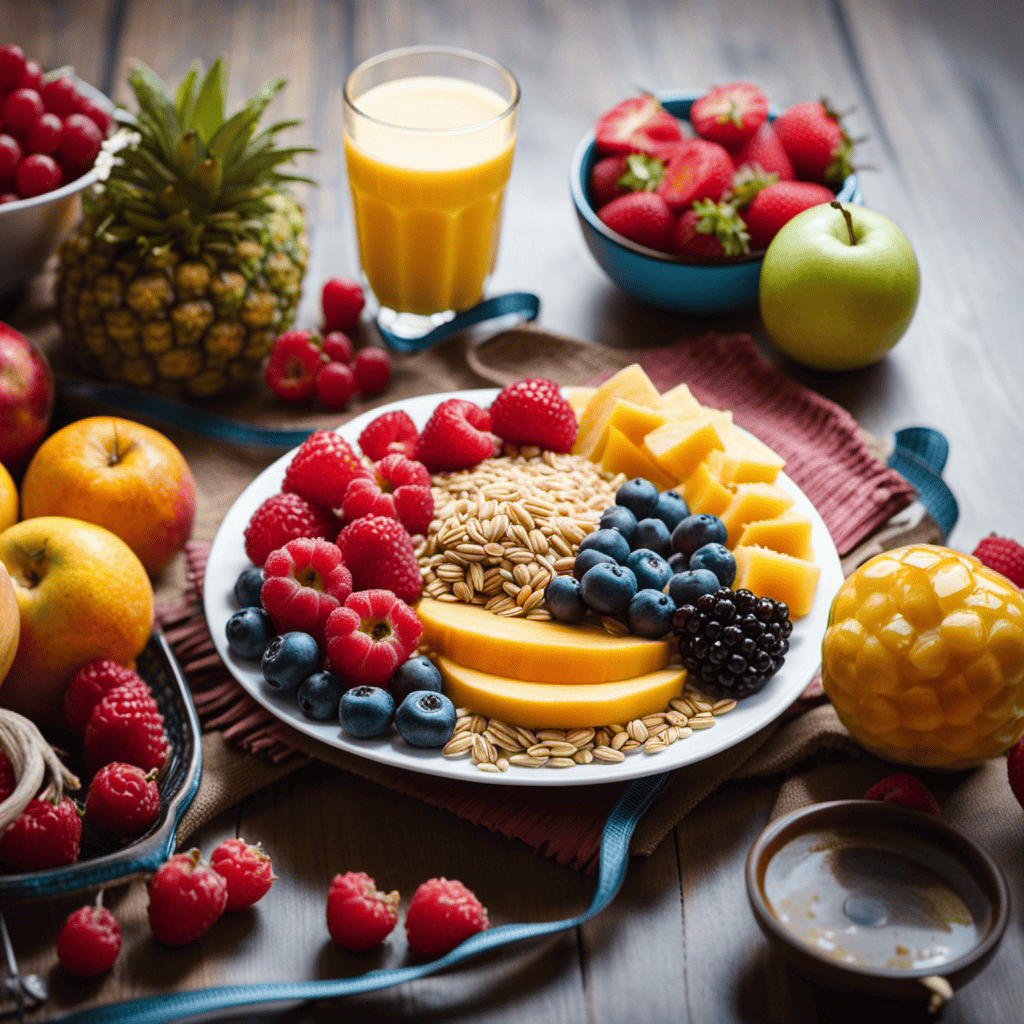Wake up and get ready! Breakfast is often considered the most essential meal of the day, and with good cause. Remember the old saying, “Eat breakfast like a king, lunch like a prince, and dinner like a pauper.”
But when it comes to weight loss, breakfast is just the beginning. A balanced meal plan, regular exercise, and moderation are the key ingredients to shedding those extra pounds.
Join me as we explore the science-backed strategies for successful weight loss and uncover the secrets to a healthier, happier you.’
Key Takeaways
- Skipping breakfast can lead to health problems and increased snacking.
- Eating at regular intervals helps burn calories and reduces temptation to snack on unhealthy foods.
- Fruit and vegetables are low in calories and fat, high in fiber, and packed with essential vitamins and minerals.
- Being active is crucial for weight loss and overall health.
What to Eat
I should focus on incorporating a variety of fruits, vegetables, whole grains, and legumes into my diet. These foods are low in calories, high in fiber, and packed with essential vitamins and minerals, which promotes successful weight loss.
Including these foods in my meals not only provides me with necessary nutrients, but also helps to keep me feeling full and satisfied.
When it comes to healthy snack options, I can choose fresh fruits, raw vegetables with hummus, or unsalted nuts. These snacks are not only delicious, but also provide important vitamins and minerals.
Additionally, it is important to include a source of protein in my meals. I can choose from lean meats, fish, eggs, or tofu. Protein helps to build and repair tissues, and also helps to keep me feeling full for longer periods of time.
The Power of Exercise
Staying active is crucial for achieving and maintaining a healthy lifestyle. Regular physical activity offers numerous benefits, including weight loss. By incorporating exercise into your daily routine, you can burn excess calories and improve overall health.
Here are some key benefits of regular physical activity:
-
Weight management: Exercise helps burn calories and fat, contributing to weight loss and maintenance.
-
Improved cardiovascular health: Physical activity strengthens the heart and improves blood circulation, reducing the risk of heart disease.
-
Increased energy levels: Regular exercise boosts energy levels and improves overall stamina and endurance.
To help you incorporate exercise into your daily routine, consider the following table:
| Morning | Afternoon | Evening |
|---|---|---|
| Brisk walk or jog | Take the stairs | Yoga or Pilates |
| Cycling to work | Lunchtime workout | Dance class |
| HIIT workout | Active chores | Team sports |
Remember, finding activities you enjoy will make it easier to stick to your exercise routine. Start slowly and gradually increase intensity and duration for optimal results.
Understanding Food Labels
One important aspect of maintaining a healthy lifestyle is understanding food labels. Food labeling regulations are in place to provide consumers with important information about the nutritional content of the products they purchase.
Decoding nutrition labels can help us make informed choices that align with our weight loss goals. When reading food labels, it’s important to pay attention to serving sizes, as the nutritional information provided is based on these portions. Looking at the calorie content per serving can help us control our calorie intake.
Additionally, checking the amount of fat, sugar, and sodium can help us make healthier choices. Choosing products with lower amounts of these components can support our weight loss efforts.
By understanding food labels, we can make more informed decisions about the foods we consume and work towards achieving our weight loss goals.
Portion Control
Understanding portion control is essential for managing calorie intake and making healthier food choices.
Mindful eating involves being aware of the portion sizes we consume and taking steps to control them.
One effective strategy is using smaller plates, which tricks our brain into perceiving larger portions. By doing this, we can satisfy our visual cues while reducing our actual food intake.
Another helpful tip is to eat slowly and stop before feeling overly stuffed. This allows our stomach time to signal fullness, preventing overeating.
Reading food labels can also aid in portion control by providing information about serving sizes and calorie content.
By practicing portion control, we can enjoy a wide variety of foods while still maintaining a calorie deficit for weight loss.
Creating a Healthy Environment
Creating a healthy environment involves making conscious choices about the foods I bring into my home and opting for nutritious alternatives to support my weight management goals. By stocking my pantry with healthy snacks like fruits and unsalted rice cakes, I can avoid the temptation of reaching for junk food.
These alternatives provide essential nutrients while being low in calories and fat. Additionally, staying hydrated plays a vital role in weight management. Drinking water helps distinguish between thirst and hunger, preventing unnecessary calorie consumption. By keeping a water bottle nearby and prioritizing hydration, I can better control my appetite and make healthier choices throughout the day.
Creating a healthy environment not only supports my weight loss efforts but also promotes overall well-being and long-term success.
Frequently Asked Questions
How many calories should I consume for weight loss?
To achieve weight loss, I need to focus on calorie counting and portion control. It’s important to consume fewer calories than I burn. By being mindful of my portion sizes and making healthier food choices, I can achieve my weight loss goals.
Can I still eat carbs while trying to lose weight?
Yes, you can still eat carbs while trying to lose weight. However, it’s important to consider portion sizes and choose healthier, complex carbohydrates. Consuming too many carbs can contribute to weight loss plateaus.
Is it necessary to track my food intake for weight loss?
Tracking my food intake is essential for weight loss. It helps me monitor my portion control, stay accountable, and identify any areas for improvement. Plus, it provides a clear picture of my progress and helps me make informed choices.
Can I drink alcohol while on a weight loss journey?
Yes, alcohol consumption can be included in a weight loss journey, but moderation is key. Alcohol is high in calories and can hinder weight loss progress. Choosing lower calorie options and limiting intake is recommended for weight loss maintenance.
How important is sleep for weight loss?
Sleep quality is crucial for weight loss. Sleep deprivation affects hormones that regulate appetite, leading to increased cravings. Prioritizing restful sleep improves metabolism, reduces calorie intake, and supports overall weight management.
Conclusion
In conclusion, weight loss is not about extreme diets or deprivation, but rather about adopting a balanced and sustainable approach.
By focusing on breakfast, regular meals, exercise, and moderation, we can achieve our weight loss goals while still enjoying our favorite foods.
Remember, Rome wasn’t built in a day, and neither is a healthy lifestyle. So let’s take it one step at a time, fueling our bodies with nutritious foods, staying active, and creating a supportive environment.
As the saying goes, ‘Slow and steady wins the race.’









